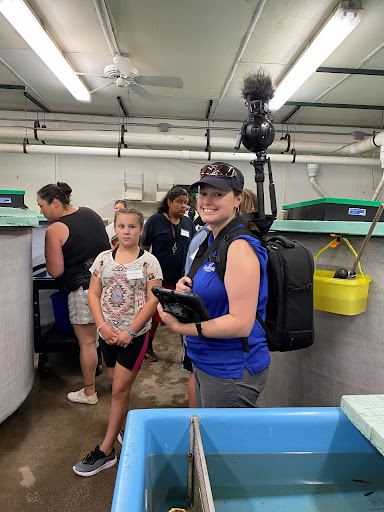Sailing Gichigami with Inland Seas and the Anishinaabeg: An educational program with KBIC in Keweenaw Bay
Inland Seas sails Lake Superior for the first time!

In July 2021, the tall ship schooner Inland Seas sailed across Keweenaw Bay in Lake Superior (Gichigami) for the first time, and members of Keweenaw Bay Indian Community sailed along and shared stories of the land, history, treaties, and natural resources. With support from Michigan State University’s Creating Inclusive Excellence Grant, Inland Seas Education Association provided programs in Houghton and Marquette, and Sault Ste. Marie. Each program was developed in collaboration with local tribes and partners, with a goal of highlighting the mindful elements of Tribal history and culture from the perspective of Tribal nations in the Upper Peninsula.
Although the Upper Peninsula is a beautiful and unique coastal region, this rural location is often isolated from the majority of Michigan’s population as more than 97% live in the lower peninsula. The programs offer a unique learning opportunity by connecting participants with the way of life practiced by many Indigenous Peoples who live in the area. In Michigan, land and waters are also home to the Anishinaabeg — the Three Fires Confederacy of Ojibwe (Chippewa), Odawa, and Potawatomi peoples.
Another goal of the program is to gather videos using a 360-degree virtual reality camera in an effort to develop immersive learning opportunities for those who could not attend the in-person program. Eventually, anyone in the world will be able to experience the beauty, history, and stories of Lake Superior through use of this virtual reality experience.

Sailing along with stories
During the July expedition to Houghton, a program titled “KBIC Waterways: Past, Present, and Future” was coordinated by Extension educator Dr. Lauren Jescovitch from Michigan State University Extension and Michigan Sea Grant who brought together partners including Inland Seas Education Association, Keweenaw Bay Indian Community’s Natural Resource Department, Michigan Technological University’s Great Lake Research Center, and KBIC tribal members. The 25 participants sailed on Keweenaw Bay and listened as stories were told of the geoheritage of the lands and waters by Erika Vye, the Geoheritage Specialist at Michigan Technological University. KBIC elder Jeffrey Loman described the importance of these lands and waters to the tribe, and Jerry Jondreau explored the implementation of treaties and challenges for reaffirmation of their rights. The cultural importance of the local fishery was also highlighted by the KBIC Natural Resources Department on the current commercial fishery which also included a tour of their tribal hatchery before sailing.
Seven Grandfather Teachings
Important cultural aspects were also included on the shipboard tour, such as: a water ceremony and offering of tobacco before sailing; moments of reflection and songs; and a closing prayer with the Seven Grandfather Teachings: respect, love, truth, bravery, wisdom, generosity, and humility. Tribal member Kathleen Smith emphasized the importance of teaching youth, and of learning traditions and values from elders, as well as continuing the process of healing, together. The program concluded when the schooner made port in the Pequaming marina where thanks and gratitude were offered.

In addition to the Houghton tour, a trip was held in August from Marquette in collaboration with the Hannahville Indian Community, and in Sault Ste. Marie with the Sault Ste. Marie Tribe of Chippewa Indians. Each program provided individualized Tribal history and culture from the perspective of these tribal partners which also highlighted the importance of our shared waters.
Michigan Sea Grant helps to foster economic growth and protect Michigan’s coastal, Great Lakes resources through education, research, and outreach. A collaborative effort of the University of Michigan and Michigan State University and its MSU Extension, Michigan Sea Grant is part of the NOAA-National Sea Grant network of 34 university-based programs.



 Print
Print Email
Email

